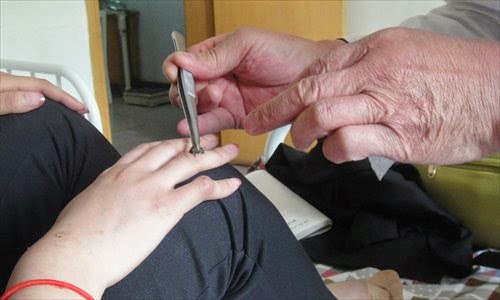Global Times, 4/22/2014
Lying on her bed in the Beijing Apitherapy Hospital, Liu Yu,
27, gritted her teeth as she was stung repeatedly by bees.
Using tweezers to hold a bee above Liu's neck, attending
doctor Wang Menglin allowed the insect to sting her jugular acupoints, and
leave behind its stinger and venom sac on the skin.
"The devil of disease is more horrible than the stings
of bees," said Liu, who takes an average of 80 stings over her entire body
during her daily treatment.
In 2010, after experiencing numbness in her legs, Liu was
diagnosed with multiple sclerosis (MS), an often debilitating disease in which
one's own immune system eats away at the protective myelin sheath that covers
the nerves. There is no known cure for MS, but Liu sought treatment at West
China Hospital of Sichuan University. After being injected with hormones for
five days, Liu's condition worsened. She lost faith in Western medicine.
Based on a few recommendations, Liu then turned to the
Beijing Apitherapy Hospital in Shunyi district, where she met with Wang. After a month and a half of
treatment in 2010, Liu was back on her feet.
"The treatment is definitely painful, but after being
stung, I feel better and there is no pain in my legs," said Liu.
"Apitherapy is a comprehensive treatment for more than
30 diseases. This biological therapy of traditional Chinese medicine includes
bee sting acupuncture and injections of bee venom," said Wang, who is also
the director of the Beijing Apitherapy Institution.
The active substance in bee venom is said to strengthen the
immune system by stimulating the acupoints and spreading to the surrounding
area. Apitherapy is especially effective for people suffering from forms of
arthritis, according to Wang…

No comments:
Post a Comment